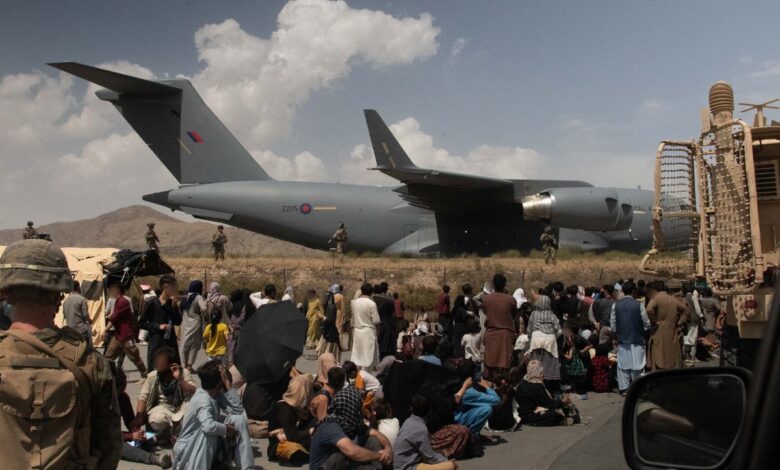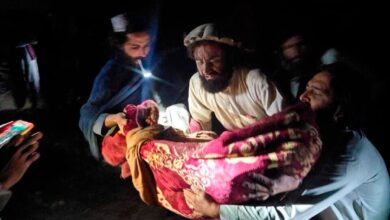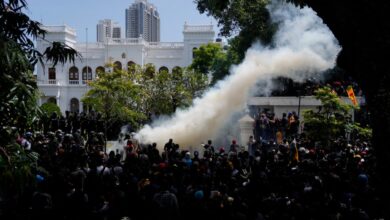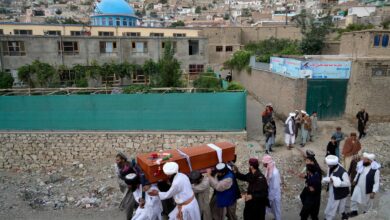‘We were afraid things would be bad, but never this’: A year after the fall of Kabul, Afghans face many crises

After their fourth attempt to board an evacuation flight from Kabul ended in violence and terror, Emad and his family knew they must learn to survive until another chance came to escape the Taliban.
The disappointment at not getting away was intensified by the knowledge of just how close they had got to doing so. They had managed to get to the airport, but could not get to the last departing planes amid the chaos of a devastating suicide attack.
Emad had contacted me while I was reporting from Kabul on the chaotic and violent final days of the Western retreat this time last year. He was desperate, asking if my fellow journalists and I could help him get away to safety.
I had got to know him and his family during my visits to the country and knew the risks he would face from the Islamists. We said we would do all we could to help.
British soldiers based at The Baron Hotel near the airport, processing the evacuees, were also willing to provide assistance. “Just get them to come to the gate and we’ll sort it”, said a sergeant in the Parachute Regiment. He had, he thought, met a cousin of Emad working as an interpreter in Nad-e-Ali in Helmand. “We owe these people don’t we? We owe them a lot: we’ll do what we can.”
It was not to be. Emad, his wife Aina and two children were turned away three times at a Taliban checkpoint on the approach to the airport before getting through on the day an Isis affiliate, Islamic State – Khorasan Province, carried out a devastating suicide bombing, massacring 170 Afghans and 13 members of US forces.
The international forces were already in the process of pulling out then – an inglorious last retreat in a mission lasting two long decades. The death and destruction which had marked the conflict continued until the very end. The Isis bombing was followed by the American military launching their last missiles of the Afghan operation, a “righteous strike” against terrorists, the Pentagon called it. They had, it emerged soon, actually killed 10 civilians, including seven children. One of the dead was a former United States Agency for International Development (USAID) worker.
Emad and his family went home from the airport counting themselves lucky to be alive. They took solace in the hope that they would find sanctuary in Britain in the near future. He had worked for British NGOs and a British government-funded civic society project. Aina was a teacher at a girls’ school and had campaigned for women’s rights. They would qualify, they thought, for refuge in the UK as people who would be vulnerable under the Taliban.
Emad and his family applied for evacuation under the Afghan Relocations and Assistance Policy (ARAP) run by the British government. They received acknowledgement of the application with the assurance that it was being looked at. They heard nothing more, despite attempts to contact various government departments in London. Seven months later Aina and the children, a 14-year-old boy and 12-year-old girl, fled to Pakistan with the help of a people smuggler after a frightening encounter with the Taliban.
Aina lost her job after the school was shut amid draconian restrictions imposed by the Talibs, breaking their pledge on education for girls. Afghanistan remains to this day the only country in the world which prevents girls from attending high school. Aina went on marches protesting about the education ban and other repressive measures being taken against women. These marches have continued, albeit in dwindling numbers. This past weekend the Talibs broke up one of them in Kabul by firing shots in the air.
The protests were taking place daily when 34-year-old Aina began to take part. She was arrested and held for six days by the Taliban before being freed following pleas by a relation, a mullah, who knew a senior commander. Aina returned home with bruises to her body and traumatised. She has not spoken to the family about what happened to her during her time in captivity.
“The bombing at the airport was horrible. We saw dead bodies, people missing hands and legs. The children were really affected. They had nightmares for many nights afterwards. And then we had Aina’s arrest,” recalls 37-year-old Emad. “After that we had to get her and the children out of the country. She would not have stayed quietly at home and they could have come for her again.
“Aina did not want to go without me. We had to persuade her to go, we reminded her of what has happened to others we knew. No one was safe, women have been killed.”
One of those who died was Rahima. Her husband Ahmad had worked for the UN, World Bank, and a British company undertaking UK government-contracted projects involving the Afghan administration.
The family fled their home in Kabul after the Taliban takeover. But Rahima returned to collect clothes and documents. She was fully aware of the danger they faced. They were spotted and the Taliban arrived saying they were looking for her husband.
There was an argument, shouting, and one of the fighters opened fire with his Kalashnikov AK-47, hitting Rahima in the head. Rahima’s brother and some neighbours rushed her to the nearest hospital. But the same group of Talib fighters turned up there, and ordered the medical staff not to treat the 26-year-old woman.
Unconscious and bleeding heavily from her injury, Rahima was taken to her sister’s house, and then to a private clinic run by a doctor who knew the family. An emergency operation was carried out, but she died soon afterwards.
“We were afraid that things would be bad when the Taliban took over, but never this bad. It is not just the repression, there is little food, people are starving. The hospitals have no medicine, people are not getting their salaries,” says Emad. He has left Kabul and is now staying in a village away from the capital. He hopes to get to a neighbouring country soon with his 70-year-old father.
“I cannot leave my father here,” he says. “He is not well, my mother died last year and he would not be able to cope by himself. I have another brother here, but he’s in hiding as well in an area which wouldn’t be safe for my father.
We have sold everything to make this journey. I don’t think we’ll see Afghanistan again





